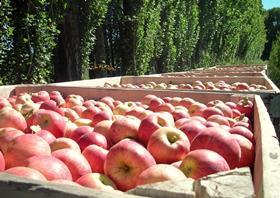
Argentina is poised to sign a new apple and pear export protocol with China during an upcoming visit by agriculture minister Nortberto Yauhar to the Asian powerhouse.
Yauhar has ignited hopes among the Argentinean apple and pear industry with his statements in a recent government release, where he said the new protocol with China would relax exporter phytosanitary requirements.
“Exports of apples and pears to China will be enabled with the signing of this protocol,” he said.
Indeed, according to Daniel Satragni, manager of Argentina's Chamber of Integrated Fruit (CAFI), the new protocol has been fully agreed to by both countries and only requires signatures to make it official.
A ministerial meeting between the two countries for the signing is anticipated in late November or early December.
“This move will strengthen the relationship with China, with which Argentina is a strategic partner and has the most agreements signed,” said Yauhar.
New appointment
The meeting will be attended by Argentina's new agriculture minister, Carlos Casamiquela, who was just appointed on Tuesday 19 November.
CAFI are reportedly delighted by the appointment given Casamiquela's notable credentials, with his former post as vice president of the national food safety organisation.
Argentina and China first signed a protocol in 2010, but the industry has broadly found it unworkable due to its stipulations regarding methyl bromide treatment against codling moth.
Argentinian growers opt not to use methyl bromide given the damage they feel it causes to fruit quality.
As a result, the industry has never shipped any apples or pears to China, instead opting to send some to its more relaxed neighbour, Hong Kong.
Approximately 45 per cent of Argentina’s fresh apple crop and 80 per cent of its fresh pear crop is exported. Combined, these comprise around half of the country’s total fresh fruit shipments.
High hopes
Satragni is confident Argentinean pears have great prospects in China, noting the strong success of US pears there as a great opportunity for Argentina to supply counterseasonal produce to China when US production ceases.
He also sees opportunities to integrate programmes with Chile, as Argentinean pears could be shipped to China along with Chilean apples from ports in Chile.
Elsewhere in Asia, Satragni pointed to good opportunities in Indonesia, where negotiations to sign a new import protocol are being finalised.
He also mentioned that phytosanitary inspectors from the Philippines are due to visit Argentina in February with a view to establishing a new import protocol, but the recent storm may delay these plans.



